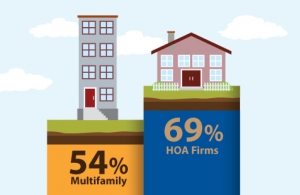Homeowners Associations vs. Property Management – What’s the Difference?
Shared post from Appfolio

It’s easy to confuse a homeowners association (HOA) with property managers. They are both involved in the management of housing communities. It could be helpful to view a brief description of both HOAs and property managers to see how the functions of each are different. In most cases, they work together, but sometimes they may come into conflict. This information should be useful to property owners, property management companies, and tenants who live in a community that is governed by an HOA.
What Are Homeowners Associations?
Neighborhoods, subdivisions, and condo complexes contain lots of housing units that are owned by many different owners. At the same time, homeowners may need to share the responsibility for certain things. They may also share expectations for the way that their neighbors will maintain their properties. Thus, these communities form HOAs to develop and enforce the rules (known as covenants, conditions, and restrictions, or CC&Rs for short) that all property owners need to abide by.
According to the Community Association Institute, over 63 million Americans reside in an estimated 320,000 association-governed communities.
The individuals who belong to these organizations also own property in that community. While all HOA members may propose and vote on rules, an elected HOA board usually has the final responsibility for ensuring that rules get kept and other responsibilities get met.
Besides making and enforcing rules, typical HOA responsibilities include:
- Maintaining common areas, like playgrounds and swimming pools
- Setting and collecting dues to pay for things like maintenance of common areas and security
- Setting budgets for the items that HOA dues pay for
- Obtaining insurance for common areas
- Hiring staff and contractors
Obviously, the HOA doesn’t physically perform all of their responsibilities. For example, they may hire security people, secretaries, and maintenance crews. In some cases, overseeing all of the work requires a separate property manager to assist them. To help with all of the tasks involved, an HOA may also hire a property manager or property management company.
What Do Property Managers Do in a Homeowners Association?
There are two different situations when a community may have both property managers and homeowners associations. In the most commonly discussed case, the property management company works for the HOA. In another case, property owners may own some houses or condos in a community that also has owner-occupied units. In this second case, the property owners and their managers are just property owners with the same status as any other owners. If property owners occupy their own housing or lease it to tenants, they still have the same responsibilities to the HOA.
Property managers as employees of the HOA: HOA members may volunteer for their positions as an investment in their community. As volunteers, they may not have time to oversee all of the day-to-day obligations of the board. In this case, an HOA might hire a property manager or property management company to assist them.
The duties of property managers can vary, but they may include overseeing paid staff or contractors, communicating with residents, collecting dues, and handling emergencies. As employees of the HOA board, property managers report to them.
Property managers as owners within the community: In this case, property managers simply have to abide by the same rules that any owners who occupy their homes do. This situation is somewhat more complex because tenants actually occupy the property. The owners and tenants may have to cooperate to stay in compliance.
The property managers for leased housing units may make sure that HOA dues get paid if this cost is simply included in the rent. Still, they need to make certain their tenants don’t violate other rules. For example, there may be guidelines about maintaining lawns, how to handle garbage, behavior in common areas, and so on. It’s prudent to include a clause in the lease about adhering to HOA rules and to make sure that renters know the guidelines.
Many HOAs Have Power to Enforce Rules
Typical HOAs will issue warnings if rules get violated. However, they do have legal power to enforce their rules. For example, an HOA can put a lien on a property if HOA dues don’t get paid. If a lawn doesn’t get mowed after a warning, they might send their own landscapers and charge the property owner a high fee. If property managers work for the HOA or are simply managing properties in the community, the HOA will factor into management duties.
The post Homeowners Associations vs. Property Management – What’s the Difference? appeared first on The Official AppFolio Blog.




